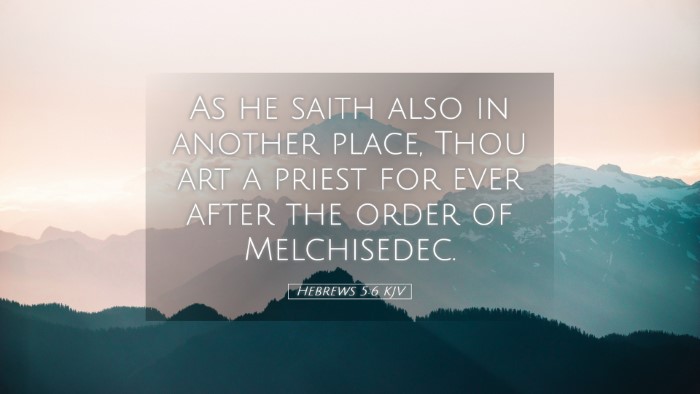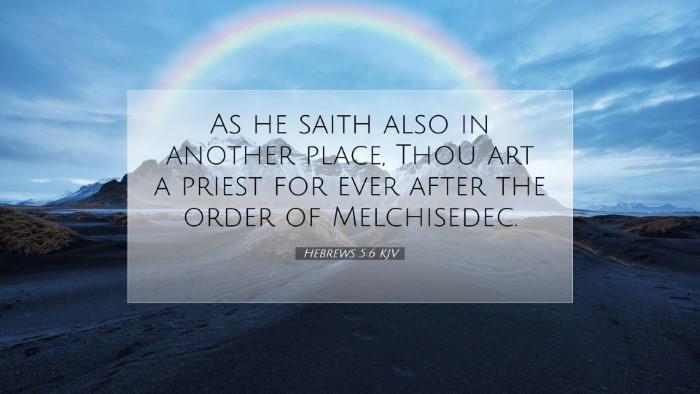Old Testament
Genesis Exodus Leviticus Numbers Deuteronomy Joshua Judges Ruth 1 Samuel 2 Samuel 1 Kings 2 Kings 1 Chronicles 2 Chronicles Ezra Nehemiah Esther Job Psalms Proverbs Ecclesiastes Song of Solomon Isaiah Jeremiah Lamentations Ezekiel Daniel Hosea Joel Amos Obadiah Jonah Micah Nahum Habakkuk Zephaniah Haggai Zechariah MalachiHebrews 5:6
Hebrews 5:6 KJV
As he saith also in another place, Thou art a priest for ever after the order of Melchisedec.
Hebrews 5:6 Bible Commentary
Bible Commentary on Hebrews 5:6
Verse: "As he saith also in another place, Thou art a priest for ever after the order of Melchisedec."
Introduction
The verse Hebrews 5:6 refers to the declaration of Jesus as a priest forever in the order of Melchizedek. This verse highlights the significance of Christ's priesthood and its eternal nature. Various public domain commentaries shed light on this scripture, illuminating its theological implications.
Contextual Background
The Book of Hebrews is unique in that it emphasizes the supremacy of Christ and contrasts His established priesthood with the Levitical priesthood. Chapter 5 is pivotal in discussing the role of Christ as a high priest, emphasizing His divine appointment and eternal nature.
Commentary Insights
Matthew Henry's Commentary
Matthew Henry expounds that the priesthood of Christ is fundamentally different from the Levitical priests who were mortal and had a lineage. He notes that the reference to Melchizedek serves to illustrate the uniqueness of Christ’s priestly authority. Melchizedek, who appeared in Genesis, is significant due to his mysterious nature—having neither record of beginning nor end, making him a type of Christ.
- Mediatorship: Christ serves as the ultimate mediator between God and humanity, fulfilling the role assigned to Melchizedek, who blessed Abraham (Genesis 14:18-20).
- Eternal Priesthood: Unlike the Levitical priests, whose service was temporary and fulfilled in a succession of lifetimes, Christ's priesthood is eternal, ensuring complete and final salvation for believers.
Albert Barnes' Notes
Albert Barnes emphasizes the permanence and tranquility of Jesus' priesthood. He illuminates the theological implications of the term “forever,” asserting that Christ’s role as High Priest does not waver or change. This assurance is foundational for believers who require confidence in their salvation.
- Divine Mandate: Barnes points out that Christ was not self-appointed; He was made a High Priest by divine decree, echoing Psalm 110:4, which the author of Hebrews cites.
- Continuity: Barnes highlights how the priesthood of Christ fulfills, rather than supplants, the Old Testament priesthood by introducing a new and eternal covenant.
Adam Clarke's Commentary
Adam Clarke elaborates on the figure of Melchizedek as a prefiguration of Christ, indicating that the mention of Melchizedek affirms the eternal nature of Christ’s priestly office. Clarke argues that Melchizedek acts as a powerful type that embodies righteousness and peace—characteristics fully realized in Christ.
- Historical Significance: Clarke notes that the absence of Melchizedek’s genealogy serves to signify that Christ's priesthood is not bound by lineage or earthly constraints.
- Spiritual Implications: This verse serves to encourage believers, emphasizing the security and hope found in the eternal priesthood of Christ, establishing a relationship with God that is grounded in permanence.
Theological Implications
The message of Hebrews 5:6 carries profound implications for Christian theology and practice. The eternal nature of Christ’s priesthood assures believers of eternal security and a direct line to God. Understanding this verse encourages deeper reflections on the nature of Jesus’ sacrifice, His role in the believer’s life, and the significance of faith in the ongoing relationship between the believer and Christ.
Encouragement for Believers
The affirmation that Jesus is a priest forever can inspire hope and conviction. Believers can rest assured that their salvation is anchored in Christ’s unchanging character and eternal intercession.
Conclusion
In conclusion, Hebrews 5:6 is a rich verse that encapsulates key doctrinal truths about the priesthood of Christ, especially in contrast to the old covenant. As Matthew Henry, Albert Barnes, and Adam Clarke’s insights reveal, this scripture invites profound reflection on the nature of Christ's eternal role as our High Priest. For pastors, students, theologians, and scholars, the contemplation of this verse holds significant implications for understanding Christology and the believer's assurance of faith.


